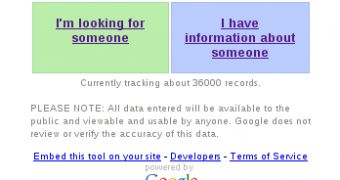Only a month and a half after a devastating earthquake wreaked havoc in Haiti, another, even bigger, earthquake hit the South American country Chile. While the quake was significantly more powerful than the Haiti one, registering at 8.8 degrees on the Richter scale, it caused significantly less destruction and loss of life. Though, 'less' in this case still amounts to billions of dollars and over 700 people dead at the last count. However, there is a bright side, the lessons learned with the Haiti quake were put to good use this time around. Case in point is the Google Person Finder tool, which is now available for the Chile disaster as well.
"For those concerned about loved ones in Chile, the Person Finder tool, initially created in the wake of the Haiti earthquake, can be used to submit or search for information about individuals who may have been affected. The Person Finder tool has been translated into Spanish and is currently available at http://chilepersonfinder.appspot.com/, as well as several media sites and the US Department of State website. The gadget can easily be embedded on any site," Jessica Pfund, from the Google Map Maker team, wrote.
The tool is easy enough to use and is available for those looking for someone, but also for those having information on someone. In both cases, all it takes is to enter the name of the person the user is looking for, or knows something about and the app will scour the growing database for any matches so that the people in question can be put in contact. There are over 36,000 records available so far.
But this isn't everything Google is doing. The Map Maker tool, which enables anyone to add mapping data to Google Maps, has been available in Chile for a while and Google is making all the data gathered so far available to organizations interested, for example those organizing relief funds or aiding on the ground. The data are available here. Google says it will update the mapping data as soon as new ones arrive.

 14 DAY TRIAL //
14 DAY TRIAL //